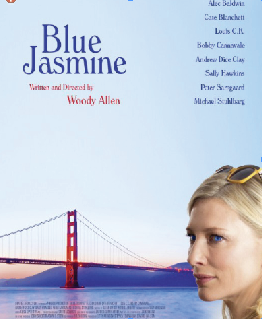Let’s Get Reel:
Blue Jasmine
First, I need to make a confession to all readers. This is the first Woody Allen film I have ever seen. I have also not seen A Streetcar Named Desire (the play from which much of this film’s plot is derived).
Now that I have that cinematic heresy off my chest, I can talk about the movie at hand, Blue Jasmine. One of the reasons I have strayed from Woody Allen’s films is because their plots never seemed interesting to me.
Going into this film, I felt much the same way. In my head I was saying, “oh boy another film about some person who lost it all, and now has to see how the other half lives.” But pleasantly, this movie not only fulfilled my low expectations, it exceeded them.
Blue Jasmine is a film that is not nearly as tired and clichéd as one might think, but from the opening scene of a goofily out-of-place CGI jet, you just cannot help but feel the film is a bit…fake.
Jasmine (Cate Blanchett) is a former socialite from New York City who has been knocked down a few notches to join the 99%. Her ex-husband (Alec Baldwin) provided for her handsomely, that is, until it turns out he had been involved in deceptive financial dealings. Jasmine loses everything, has a nervous breakdown, and goes to San Francisco to stay with her sister, Ginger (Sally Hawkins). Jasmine has a difficult time adjusting to life in San Francisco and struggles to find a meaningful way to pass her time.
Meanwhile, Jasmine brings many headaches to her overburdened sister, insisting that her boyfriend (Bobby Cannavale) is a no-good loser. Eventually throughout this wild ride of emotions and nervous breakdowns, both Jasmine and Ginger end up falling for a lover: Dwight (Peter Sarsgaard) for Jasmine and Al (Louis C.K.) for Ginger.
My first critique of this movie is something many of you may or may not have been asking. Do any of these people have kids? They do, but unfortunately Woody Allen relegates them to the littlest allotment of screen time possible and it seems their only purpose is to annoy Jasmine. Ginger’s two little mischievous boys have no real character traits and could have just as easily been pulled from a Disney TV show. They fight, they scream, they make stupid faces, but they never are affected as dramatically as you would expect children in their situation to be. Their mother is already divorced, she has a scummy boyfriend, she gets involved in a love affair, their neurotic Aunt Jasmine is staying with them, and yet they seem like accessory pieces to this adult drama. Jasmine’s step-son, Danny, gets slightly better character development, but his all-important meeting with Jasmine left me supremely unsatisfied as she uttered, “Where were you when I needed you?” That line sums up Allen’s treatment of children in this movie: as adult play-things.
My second, smaller qualm with the movie is Jasmine’s psychological condition. Yes, she is supposed to be emotionally scarred, but somehow when she has nervous breakdowns – is muttering, lying compulsively, or talking to herself – it never seems convincing or compelling.
This film certainly offers a lot in the way of life lessons. Especially the simple ones like, “money doesn’t buy happiness.” Its warm cinematography and vibrant characters will draw viewers into the beautiful scenery in San Francisco, but ultimately will leave them feeling like it was more of a façade.



